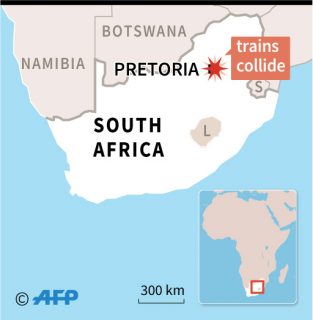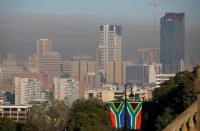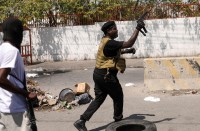
JOHANNESBURG, South Africa (AFP) — Two passenger trains collided head on during the morning rush hour in South Africa’s capital city Pretoria Tuesday, killing three people and injuring hundreds, emergency services said.
Two critically injured people were airlifted from the scene of the crash in Mountain View, northern Pretoria, spokesman Charles Mabaso told AFP.
Another 641 people were hurt, with 11 sustaining critical injuries and 62 suffering “moderate” injuries.
“The current fatalities stand at three, but it still might rise,” said Mabaso.
When paramedics arrived on the scene, they found carriages from both trains tilting half off the track.
“Numerous passengers were found either in the trains or found walking around on the scene,” Russel Meiring, a spokesman for the ER24 emergency services, said in a statement.
Rail accidents are common in South Africa. In 2016-17, 495 people were killed on the country’s railways, according to the Railway Safety Regulator.
Transport Minister Blade Nzimande said the accident was caused by signals failure which he blamed on cable theft.
“I’m truly saddened about this continuing deaths of commuters at Metrorail,” said the minister after visiting the scene of the crash.
“I’m personally outraged …we can’t every time be having the repeat of the same problem.
“As government, we have to bring this to end. We need more stringent measures to be able to deal with this situation.
“We need to find a way of dealing with rail safety,” he said, demanding explanation from the country’s rail agency.
The theft of railway cables is a continuing problem in the country. They are often melted into ingots before being smuggled to Asia.
Khanyisile Kweyama, the chairwoman of the board of the Passenger Rail Agency of South Africa (Prasa), admitted that the security of rail signalling cables “hasn’t been” great.
A year ago, in one of the country’s worst rail disasters, a passenger train smashed into a lorry at a level crossing near Kroonstad in the central Free State province, killing 19 people and wounding 254.
© Agence France-Presse







